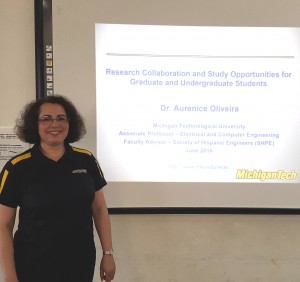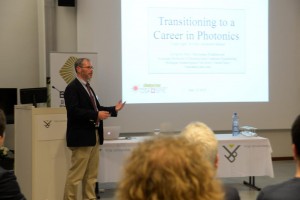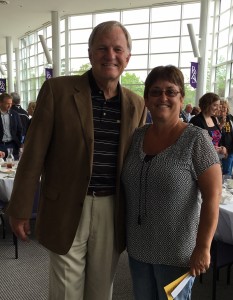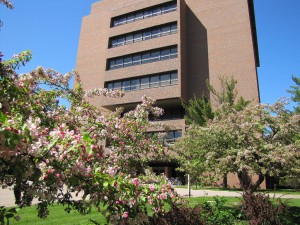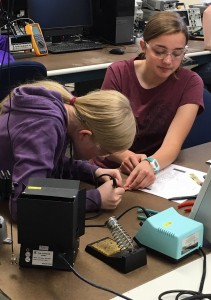
Fridays with Fuhrmann, June 24, 2016
This week Michigan Tech is hosting our Women in Engineering program, part of our larger Michigan Tech Summer Youth Programs. WIE is a high school program that brings young women with an interest in science and engineering to campus, and gives them a chance to investigate a variety of engineering careers across all disciplines. Participants work in teams on interesting and challenging engineering projects, get insight from role models working in industry, learn about the college application process, experience college life, and enjoy team competitions, entertainment, and outdoor activities. As an added bonus this year, the weather has been absolutely spectacular and so our guests get to see what a great place the Keweenaw can be in the summer.
We have about 360 young women coming through ECE Department in this year’s program. ECE Associate Chair Glen Archer organizes things at a high level, and ECE PhD student and soon-to-be graduate Jenn Winikus is in charge of implementing the program and really being the face of the ECE Department for the participants. I thank them both for their hard work and outstanding efforts.
I have touched on this in previous columns, but it bears repeating that bringing more women into engineering fields, especially electrical and computer engineering, remains an important and perplexing problem. Our undergraduate female enrollment in the ECE Department has hovered around 10% for many years. Recent trends point to a slight increase, but we are nowhere near the percentage of female college enrollment overall, or even in engineering. We spend a lot of time wondering why this should be the case, and what we can do about it.
The first question that one unfamiliar with our field might ask is, are young women scared off because they cannot handle the rigors of an electrical engineering education? The answer to that is an unequivocal no, and in fact the suggestion of such a thing would be considered offensive around here. There is no evidence to suggest that women are any less capable in math, science, and engineering topics and engineering design skills than their male counterparts, in fact all of our everyday experience here points to a strong capable group of women making their way through our programs just like the men. They engage in all of our educational and leadership programs and are highly recruited by industry. Some might suggest there is a “confidence gap”, in which women who struggle with the material lose confidence in their ability to overcome obstacles and achieve success. While this can certainly happen, I see it just as often with some of our male students who aren’t getting it and decide to take a different path. Michigan Tech is making a major effort to support students, both men and women, who need a little extra push to be successful in their first year or two and continue in the program. How much we should be doing is a matter of some debate, but on the whole I am supportive of efforts to see our students gain the confidence they need to succeed in our educational programs and enter the engineering workforce.
So, if ability is not the issue, then could it be interest? Some say that women are more interested in the “helping professions”, which might explain the much popularity of programs in biomedical engineering and environmental engineering. Personally, I reject this notion. What could be more “helping” than providing reliable electrical power to an entire population, providing reliable worldwide communication, developing the technologies that keep our soldiers safe abroad and our citizens secure at home, or designing a wide array of products for the audio and visual entertainment? Perhaps we need to work harder to educate everyone on all the ways that electrical and computer engineers have helped humanity. Even as you read this, you are taking advantage of technology developed over the past decades by thousands of electrical engineers, and as you walk away from your computer and turn to other activity, chances are you are going to pick up something else that has ECE fingerprints all over it. We help, we really do!
Maybe there is something about the profession itself that women find unattractive. This, outside of just not knowing what the opportunities are, is the argument that makes the most sense. It is true that electrical engineering (and mechanical engineering too) are fields that are dominated by men. Young women surveying that landscape simply may not see a place for themselves and their future. Women can look at biologists, doctors, or biomedical engineering, and easily project themselves into those professions because there is so much parity already. The workplace environment just looks so much more inviting in those fields. Stories about the “brogramming” culture in Silicon Valley don’t help much either. There is plenty of work to be done to make sure that our workplaces and our educational institutions are places that are welcoming to all, and a little extra effort is needed in electrical engineering to make that obvious, as it should be, when it comes to women.
It comes down to a chicken and egg problem – the fields of electrical and computer engineering need to attract more women, and the way to do that is for the fields of electrical and computer engineering to have more women in them. While we continue to struggle to reach a “tipping point” in this regard, we do what we can, like hosting the Women in Engineering program and diversifying the concentrations in our educational programs. More importantly, we need to be vigilant in maintaining a constant awareness of the importance of diversity and inclusion, and I am beginning to realize that inclusion is the more important piece of the two. It is not enough to bring people with a variety of gender and ethnic backgrounds into the organization; all people must feel like that are part of the inside group, making decisions and being responsible for the success of the organization. I see that here at Michigan Tech and I am certain it is an issue in engineering workplaces nationwide. This is an area where I will push for change as long as I am ECE chair at Michigan Tech.
Speaking of which – and I’ll close with this – last week I signed my reappointment letter which keeps me in this position for four more years (I have one year remaining in my current term, and will start a new 3-year term in 2017.) I look forward to serving Michigan Tech and the ECE Department, and continuing to share my experiences with you.
– Dan
Daniel R. Fuhrmann
Dave House Professor and Chair
Department of Electrical and Computer Engineering
Michigan Technological University
